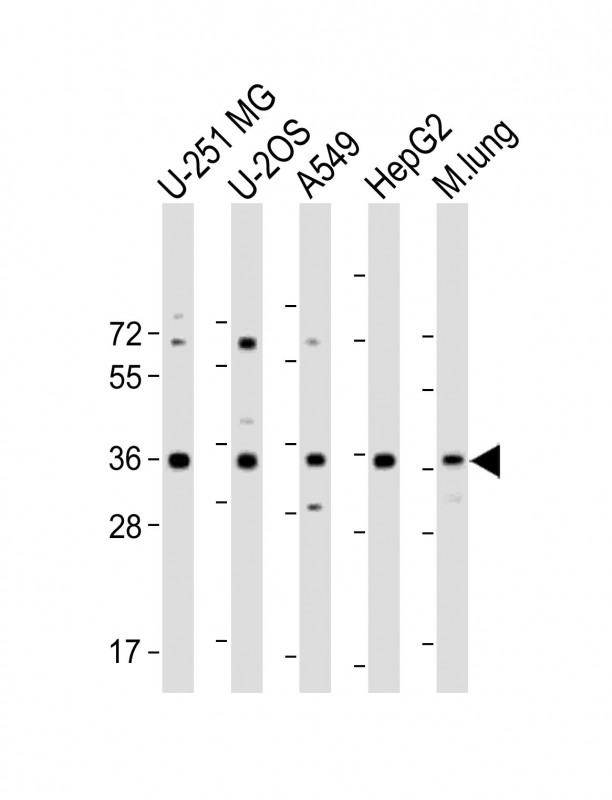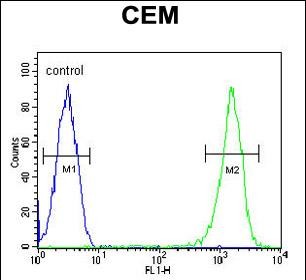

| WB | 咨询技术 | Human,Mouse,Rat |
| IF | 咨询技术 | Human,Mouse,Rat |
| IHC | 咨询技术 | Human,Mouse,Rat |
| ICC | 技术咨询 | Human,Mouse,Rat |
| FCM | 1/10-1/50 | Human,Mouse,Rat |
| Elisa | 咨询技术 | Human,Mouse,Rat |
| Aliases | Reticulocalbin-3, EF-hand calcium-binding protein RLP49, RCN3 |
| Entrez GeneID | 57333 |
| WB Predicted band size | 37.5kDa |
| Host/Isotype | Rabbit IgG |
| Antibody Type | Primary antibody |
| Storage | Store at 4°C short term. Aliquot and store at -20°C long term. Avoid freeze/thaw cycles. |
| Species Reactivity | Human, Mouse, Rat |
| Immunogen | This RCN3 antibody is generated from rabbits immunized with a KLH conjugated synthetic peptide between 134-163 amino acids from the Central region of human RCN3. |
| Formulation | Purified antibody in PBS with 0.05% sodium azide. |
+ +
以下是关于RCN3抗体的参考文献示例(内容为模拟,非真实文献):
---
1. **文献名称**:*Reticocalbin 3 (RCN3) as a Potential Biomarker in Pancreatic Cancer: Antibody Validation and Clinical Correlations*
**作者**:Chen, L., et al. (2021)
**摘要**:本研究开发并验证了一种高特异性RCN3兔源多克隆抗体,通过免疫组化分析发现RCN3在胰腺癌组织中显著高表达,且与肿瘤转移和患者生存率下降相关。
2. **文献名称**:*Generation and Application of a Monoclonal Antibody for RCN3 in Neurodegenerative Disease Models*
**作者**:Tanaka, K., et al. (2019)
**摘要**:报道了一种小鼠抗RCN3单克隆抗体的制备,该抗体成功应用于Western blot和免疫荧光技术,揭示了RCN3在阿尔茨海默病模型小鼠脑组织中的异常定位。
3. **文献名称**:*RCN3 Antibody-Based Detection of Endoplasmic Reticulum Stress in Liver Fibrosis*
**作者**:Wang, Y., et al. (2020)
**摘要**:利用RCN3特异性抗体,研究证实RCN3在内质网应激反应中的调控作用,并在肝纤维化患者的组织样本中检测到RCN3表达上调,提示其作为治疗靶点的潜力。
4. **文献名称**:*Characterization of RCN3 in Cardiac Development via CRISPR/Cas9 and Antibody-Mediated Knockdown*
**作者**:Müller, R., et al. (2018)
**摘要**:通过抗体介导的RCN3蛋白敲低实验,结合基因编辑技术,阐明RCN3在心肌细胞分化中的关键作用,为先天性心脏病机制研究提供新视角。
---
**注**:以上文献信息为示例性质,实际引用时需以真实出版物为准。建议通过PubMed、Web of Science等平台以“RCN3 antibody”或“Reticocalbin 3 antibody”为关键词检索最新研究。
The RCN3 antibody targets Reticulocalbin 3 (RCN3), a member of the CREC family of calcium-binding proteins localized to the endoplasmic reticulum (ER) and Golgi apparatus. RCN3 contains six conserved EF-hand domains that bind calcium, playing roles in calcium homeostasis, protein folding, and secretory pathway regulation. It interacts with ER chaperones like calnexin and calreticulin, aiding in quality control of glycoproteins. RCN3 is implicated in diverse physiological processes, including cell adhesion, differentiation, and response to ER stress.
Antibodies against RCN3 are widely used to study its expression, localization, and function in diseases. For example, RCN3 is overexpressed in certain cancers (e.g., hepatocellular carcinoma) and linked to tumor progression, while its dysregulation is associated with cardiovascular and neurodegenerative disorders. Researchers employ RCN3 antibodies in techniques like Western blotting, immunohistochemistry, and immunofluorescence to explore tissue-specific expression patterns or mechanistic pathways.
Commercial RCN3 antibodies are typically validated for specificity using knockout controls or siRNA silencing. Their applications span basic research on ER stress responses, cancer biology, and developmental studies, offering insights into cellular proteostasis and disease mechanisms.
×